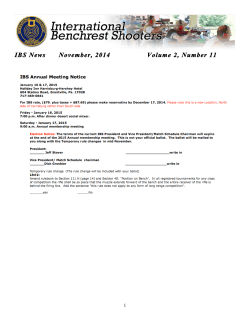
FCPS News Release 3-25-15 - Fauquier Co. Regional Science
Fauquier County Public Schools News Release FOR IMMEDIATE RELEASE March 25, 2015 Karen Parkinson, Coordinator of Information Phone (540) 422-7031 kparkinson@fcps1.org FAUQUIER COUNTY REGIONAL SCIENCE & ENGINEERING FAIR DRAWS 51 PARTICIPANTS While “Hannah, Hana” may not have the same repetitive ring as the famous Brady Bunch line “Marcia, Marcia, Marcia,” still “Hannah, Hana” is earning its own place in local history, and at a much more academic level. In the two-year history of the Fauquier County Regional Science & Engineering Fair, both overall winners have worn the “H” moniker: Hannah Small in 2014 and Hana Pross in 2015. Hmmm, wait a minute, wasn’t that the case at the Fauquier County Spelling Bee in 2014 and 2015 when two students of the same name took top honors – Kyra Holland in 2014 and Kyra Lucas in 2015? Kyra, Kyra. Hannah, Hana. Is this a Name Game or an Odds Equation? Is this a completely random, unscientific occurrence? Is it more a factor of the popularity than the power of the names? Is the data trend reliable? Are these testable questions? While the name coincidence may be interesting, the questions, the research, the data, the conclusions and the presentations were far more compelling at the Second Annual Fauquier County Regional Science & Engineering Fair Saturday, March 14 at Fauquier High School. Some 51 public, private and homeschooled high school and middle school students from throughout the county competed in the fair. Cash prizes totaling $4,400 were on the line as well as the chance to advance to a higher level of competition with larger cash prizes – the top three middle school projects are eligible to apply to the Broadcom MASTERS competition (Math, Applied Science, Technology and Engineering for Rising Stars), and the top 10 high school projects will compete at the Virginia State Science & Engineering Fair (VSSEF) March 28 at VMI in Lexington and the top high school prize winner will compete at the Intel International Science & Engineering Fair in Pittsburgh May 10-15. Senior Division Winners At the regional fair two Mountain Vista Governor’s School/Kettle Run High School seniors, a Wakefield School sophomore, and a Mountain Vista Governor’s School/Fauquier High School senior walked away with the top honors, accolades and cash prizes in the senior division (grades 9-12), which included 16 projects. Winners were as follows. • 1st place: Hana Pross, MVGS/KRHS, $1,500 prize for her project “Parabolic Equation Impact on Solar Reflector Conversion Efficiency” • 2nd place: Rachel Seeberger, MVGS/KRHS, $750 prize for her project “The Effects of Tailets on Aerodynamic Performance” • 3rd place: Jeongwon Seo, Wakefield, $500 prize for his project “Making an Affordable Computer for Countries Which Have GDP Under $15,000” • Honorable Mention: Claire Burke, MVGS/FHS, $250 prize for her project “The Effect of Zinc Oxide on Blocking Ultraviolet A Radiation” Arriving at the fair, Hana Pross said she hoped that she would walk out with some sort of prize. “I did not expect to come in first place, though!” she said. “I was very excited when I heard my name called. I did not expect to get the chance to attend the Intel International Science and Engineering Fair, but I am thrilled to go!” Continued on next page As a student at Mt. Vista Governor’s School, Hana was required to conduct original research this past summer. She said that at the beginning of her research process, she was not sure what she wanted to study. She said it became clear to her early on that she would be interested in something involving energy, but at the time she thought that she would focus on mediums of storing energy. “As I continued researching, though, I became less interested in what stored the energy and more interested in what kind of energy I was looking at, and solar energy really caught my eye,” she said. “Having always taken an interest in renewable energy and the conservation of resources, I felt that I could study something impactful and interesting by trying to improve a means of harnessing solar energy.” Essentially, Hana studied a specific type of solar reflector (which converts solar energy into usable thermal energy) called a parabolic trough; the shape/width of a parabolic trough is determined by a parabolic function. “I tested how changing that function, thus changing the width of the parabola, would alter the amount of solar energy the solar reflector would be able to convert,” Hana said. Her project entailed building four model troughs, each corresponding to a different equation, and testing each one’s ability to convert “imitation” solar energy. The most challenging part of the project, she said, was running the trials; she ran a total of 120 hour-long trials. “It was very time intensive,” she said. Hana said she had enjoyed learning about her topic and telling others about it as soon as she started researching it, so she wanted to present her research at as many science fairs as she could. “The Fauquier [County] Regional Science & Engineering Fair was a great opportunity, and I am so glad that I chose to participate in it,” she said. “I think that this fair is an excellent way for students who enjoy STEM-related subjects to explore what interests them and to teach others about whatever that may be. It provides a great opportunity for students who are passionate about science to come together and interact with the community, as well as receive advice from some excellent judges.” In addition to the four top winners in the senior division, six other projects were selected to advance to state competition. They are as follows. • “Pervious Concrete Aggregate Mixtures and Permeability” by Shannon McAvoy, MVGS/KRHS 12th grader • “How to Play Music Notes with Mathematical Equations” by Micensie Barrett, MVGS/FHS 11th grader • “Optimum Location of Floor Harvester in a Hallway and Feasibility Study” by Brad Houska, MVGS/KRHS 12th grader • “The Effect of Vitamin B Complex on the Cellular Respiration of Yeast” by Marissa Windsor, MVGS/KRHS 12th grader • “Effect of Octane on Performance in Engines” by Zach Kersey, KRHS 12th grader • “The Effect of Non-ionizing Radiation on the Sprouting of Raphanus sativus Radish Seeds” by Eliane Zalewski-Williams, MVGS/KRHS 12th grader Junior Division Winners In the junior division (grades 6-8), which included 27 projects, the winners were as follows. • 1st place: Stephanie Schefer, 7th grader at Warrenton Middle School, $600 prize for her project “Mirror Image?” • 2nd place: Joe Barrett, 8th grader at Marshall Middle School, $400 prize for his project “Biomass Energy: Garbage In Gas Out” • 3rd place: Alice Christensen, 8th grader at Marshall Middle School, $300 prize for her project “Music and the Mind” • Honorable Mention: Chandler Brown, Bobby Guiney and Clay Sailor, 6th graders at Wakefield School, $100 for their joint project “Effect of Fertilizer and Foliar Spray on Plant Growth” Continued on next page As first- and second-place winners in the junior division, Stephanie Schefer and Joe Barrett were selected to be observers at the state competition. Stephanie said she entered the Warrenton Middle School science fair (which led to her participation in the regional science fair) because it was “a unique opportunity to have fun with science.” “I chose my topic after watching a TV show with an actor that has a crooked eye, and it made me wonder how symmetrical people’s faces really are,” she said. She began her study of facial symmetry by taking and printing pictures of 26 people. “Next I took 11 measurements of the five facial features using a caliper and studied them to determine if the features were symmetrical or not. I found that no one had a completely symmetrical face (all five features symmetrical), but almost 60 percent of people had four symmetrical features,” she said. “Another interesting thing I discovered was that everyone’s eye widths were symmetrical.” Stephanie said that since this was her first year participating in the regional fair, she was not expecting to win. “There were a lot of good projects so I was very surprised when they called my name, but I was excited to have won,” she said. On the morning of the competition, a panel of scientists and engineers interviewed the students stationed at their projects before selecting the top winners. Judges were Greg Adams, Dr. Allen Atkins, Heather Bolden, Dr. Sara Byers, Dr. Paul Cooper, Bill Davidson, Dr. Michael Grosso, Dr. John Harre, Dr. John Schreifels, Dr. Catherine Swanwick, Dorothy Tepper and Dr. John Williams. More information about the judges is included in the Science Fair program. Winners of the Fauquier County Regional Science & Engineering Fair received their awards during a luncheon (courtesy of the Sharp Science Students Foundation) which concluded the event. Keynote speaker was the head judge, Dr. Allen Atkins, who spoke about the fallacy of thinking that “failure is not an option.” He said that during his lengthy career in engineering he once had a boss who told him that his projects were too successful; his employer didn’t necessarily want to see everything that the young Allen could succeed in, but instead wanted to see when and where he could push the limits to the point that “things broke.” Failure, he said, is a way of measuring when one has actually taken risks. In addition to the science and engineering fair winners, a number of other awards were presented by head special awards judge Dorothy Tepper, a geologist who retired after 30 years with the U.S. Geological Survey. (Project names are listed only if they have not previously been listed in this news release): American Psychological Association Award – Alice Christensen ASM Materials Education Foundation Award – Audrey Brown, Kristen Guiney and Kati Russell, 8th grade, Wakefield School, “Which Sunscreens Protect Skin from the Sun More” Arizona State University Walton Sustainability Solutions Award – Hana Pross and Shannon McAvoy Mu Alpha Theta Math Honor Society Award – Hana Pross NOAA “Taking the Pulse of the Planet” Award – Hana Pross U.S. Air Force Award: Middle School – Matthew Zieg, 7th grade, Home School, “Bendy Beams” and Nick McCloskey, 8th grade, Auburn Middle School, “Is Beet Juice an Alternative to Rock Salt for De-Icing Roads?” Continued on next page U.S. Air Force Award: High School – Rachel Seeberger and Gideon Pfeffer, 12th grade, Fauquier High School, “The Effects of Caffeine on Age and Alertness” U.S. Metric Association Award – Liam Heppard, Ian Sekelsky and Declan Downey, 7th grade, Warrenton Middle School, “Lively Legumes” Virginia Dental Association and Northern Virginia Dental Society Science Talent Awards Program – Anya Parks, 10th grade, Wakefield School, “The Effect of Biological Benefits on Human Physical Attraction” and Sarah Kerns, 8th grade, Highland School, “Are You Drinking Your Teeth Away?” Virginia Lakes and Watersheds Association Award: Middle School – Maclean Stevens, 8th grade, Auburn Middle School, “Do You Always Get What You Pay For?” Virginia Lakes and Watersheds Association Award: High School – Maggie Yeck, 12th grade, Mountain Vista Governor’s School, “The Difference in the Cut-Stump and the Spray on Methods of Control for Lonicera japonica” Yale Science and Engineering Association, Inc. Award – Jeongwon Seo United States Air Force Certificate of Achievement: Middle School – Nick McCloskey and Joe Barrett United States Air Force Certificate of Achievement: High School – Rachel Seeberger and Claire Burke In addition to the science fair competition itself, this year’s fair included some interesting side events. Jonathan Maxwell, a world-class chess instructor whose students include Paul McCartney’s son Arlen, played an exhibition chess match, consisting of 12 concurrent games of chess with the students and visitors at the fair. He stood surrounded by four tables, each set up with three chess sets, each with an eager opponent. There were at least two full sessions with some players swapping in for additional games so Maxwell played, and won, against at least 25 opponents. Maxwell said the science fair afforded a “rare, exciting opportunity” to promote chess within the community. “Chess, in short, is the missing owner’s manual for the human mind,” he said. “Its academic value is beyond question as its results have been thoroughly documented. This simultaneous exhibition was a wonderful way to introduce the community to the chess medium and discover for themselves the unique synthesis of fun and intellectual growth that chess provides.” Other interesting side events included a performance by 13-year-old magician Bryce Moore, an eighth-grader at Warrenton Middle School, who opened the awards ceremony. Also, just before the judging began, PI-shaped cookies, prepared by The Angry Baker, were given out to students, judges and visitors. The judges and fair participants counted down to the magical “PI Moment,” the once-in-a-century event when our time stamp holds the maximum digits of PI on 3-14-15 at 9:26:53 a.m. For the second year in a row, the main sponsors of the fair were Dr. David C. Collins, chairman and CEO of Learning Tree International, Inc.; the Sharp Science Students Foundation; and Linda and John Suter, retired engineer and scientist respectively. The Suters recruited “Micro” sponsors (in increments of $ 150), who donated funds to send students to the Virginia State Science and Engineering Fair, and “Nano” sponsors, who pledged support for a specific local school science fair. Sponsors are listed in the Science Fair program. The regional fair was definitely a community event. Special guests were Warrenton Vice Mayor Sunny Reynolds and Warrenton Town Councilman Jerry Wood along with School Board Chair Sheryl Continued on next page Wolfe. Among those making contributions, donations or discounted prices were Learning Tree International, Savory Fare Catering, Sharp Science Students Foundation, Leading Edge Screen Design, Cold War Museum at Vint Hill, g. whillikers Toys & Books, Fauquier Fotos, Catlilligames, Discovery Publications, Piedmont Press & Graphics, Warrenton Lifestyle Magazine, Broad Run Lifestyle Magazine, MaxwellChess.com, and The Angry Baker. Vineeta Ribeiro, mathematics teacher at Warrenton Middle School, who holds a degree in electrical engineering, served as the director of the Fauquier County Regional Science & Engineering Fair for the second consecutive year. She said of this year’s fair, “There was a great deal of energy and excitement in the fair this year. Many people in the academic and business community, not to mention parents and the students themselves, supported this endeavor. I think a Science and Engineering Fair is an excellent, one-stop-shopping opportunity for students to use many different types of skills in conducting and presenting their research and ideas.” In regard to the number of projects and participants, Ms. Ribeiro said, “We may not have grown in numbers, but the complexity increased because this year we required all levels to follow the requirements of the Intel International Science and Engineering Fair. Our fair this year provided free tri-folds to the students in the local school fairs. We also held five free workshops in the fall that were open to students, parents and teachers. It will take time to grow this fair. It might be tempting to compare our numbers to Fairfax County, which has over 400 projects, but then I have to remember that this is their 60th year of having a Regional Science Fair. We have time to grow, and we have plenty of talented and willing resources in our community, so I am optimistic about the future.” Senior Division Winner Hana Pross, who plans to attend the United States Naval Academy to study either mathematics or engineering with aspirations of a career in the U.S. Marine Corps, offered a word of advice for students who might be interested in entering next year’s science fair: “Choose a topic that excites you,” she said, “and one that can have a big impact on the rest of the world. It’s really easy for others to relate to your project when it involves something that affects them and when you are passionate about it yourself.” SCIENCE Please see next page for additional photos Chess is not always about winning. Sometimes it’s simply about learning. Please see next page for additional photos Photos by Fauquier Fotos
© Copyright 2025









